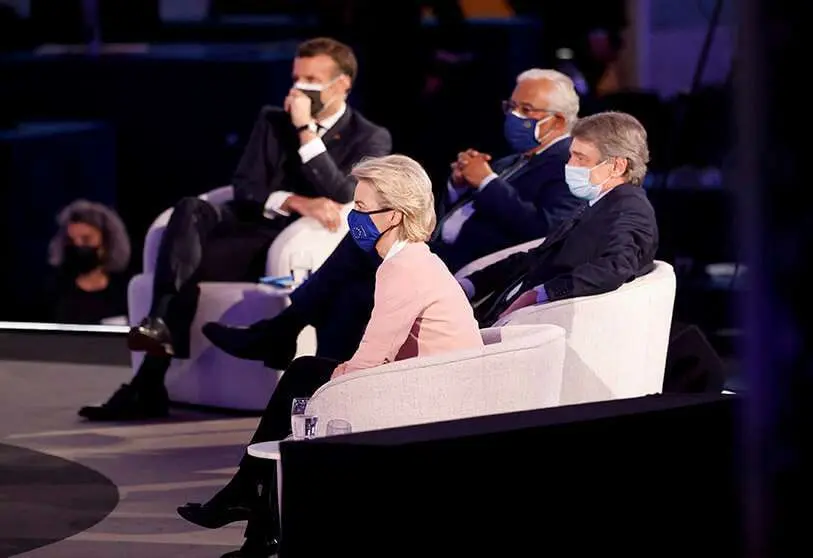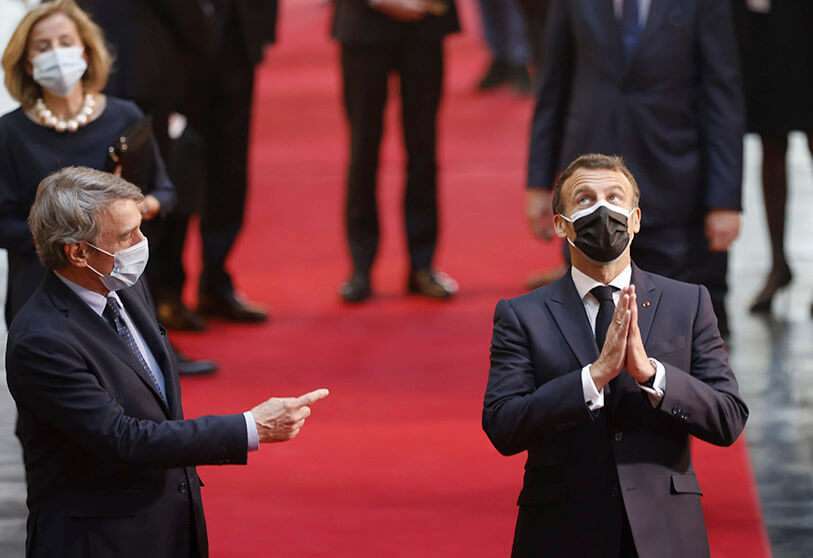The future of Europe

On Europe Day, the European Union organised the Conference on the Future of Europe (CoFE) in Strasbourg. This event is just the beginning of a series of debates where European citizens are encouraged to participate in shaping a new European community. The Future of Europe conference was announced for the end of 2019, but due to the coronavirus pandemic, it could not be opened earlier.
The event was led by French President Emmanuel Macron, European Parliament President David Sassoli, Portuguese Prime Minister Antonio Costa and European Commission President Ursula von der Leyen.
From the start of the event, European citizens were encouraged to participate in the conference by expressing their ideas or opinions under the hashtag #TheFutureIsYours.

The French president was responsible for launching the speaking tour of the four European leaders. Macron, seen as the "father" of the conference, began by recalling the importance of Strasbourg. "Strasbourg is the living symbol of the Europe that has turned its back on war," said the French president. Macron's speech revolved, above all, around the coronavirus pandemic. But instead of doing so from a pessimistic perspective, he tried to show the positive aspects and the lessons we can learn from this crisis. During these months, the European model has been reaffirmed and Europe's solidarity has been boosted by projects such as Covax. The French president asked citizens to remain optimistic and ambitious.
Macron listed some of the challenges to be addressed at the conference, such as defending the sovereignty of the European area and democracy, which "we must guard as a treasure". He also referred to climate change, one of the central issues of the conference. To conclude his speech, Macron pledged that the results of this round of debates would change the way the EU operates.

David Sassoli, happy to be back in the European Parliament, the European body he heads, focused on the lessons the EU can learn from this health crisis. "The coronavirus has taught us that we are all a cog in the same wheel," said Sassoli.
The Italian politician expressed his desire to improve the functioning of the EU, still based on "European values". Praising the continent's democracy, he alluded to authoritarianism, "very present on the international scene". He also recalled the storming of the US Capitol in January. "Democracy is built every day, but it is a fragile system," he said.
It was Antonio Costa's turn. The Portuguese Prime Minister based his speech on a poem by the Portuguese writer Luís de Camões. Mr Costa spoke in three languages during his speech, a sign of the linguistic diversity of the European community. This aspect was underlined by the Portuguese politician, who recalled that the new accessions to the EU have brought more cultural diversity. "We have come a long way in our union, but we are still below what is needed," he stressed.
Mr Costa said he was satisfied with the public's opinion on the management of the coronavirus. According to a Eurobarometer, Brussels' response to the pandemic has put the EU in a position of maximum trust among citizens. "Europeans have not felt abandoned," he said.

The Portuguese Prime Minister mentioned issues that have not yet been addressed, such as youth unemployment, the demographic crisis, the precariousness of the labour market and gender equality, a phrase that caused controversy at the recent summit in Porto.
The President of the European Commission, Ursula von der Leyen, closed the round. Like Sassoli, she expressed her happiness to be back in the European Parliament, which had been closed due to the pandemic. And, like Macron, she stressed the importance of the city in European history. Von der Leyen also made a literary reference and began her speech with a quote from a book by Antoine de Saint-Exupéry, "to love is not to look at each other, it is to look together in the same direction". His speech was based on this phrase, on unity and the search for a common vision for all Europeans. The president focused on climate change and the consequences it could have. "We have as much at stake as in 1950, when Europe was devastated by war. Because climate change can be as destructive as war," warned Ms von der Leyen.
Then it was the turn of the citizens. Several Europeans had the opportunity to ask questions to Guy Verhofstadat MEP, Dubravka Suica, Vice-President of the European Commission for Democracy and Demography, and Ana Paula Zacarias, State Secretary for European Affairs of Portugal. Citizens' interests included culture, climate change, diversity and democracy. In this round of questions, Mr Verhofstadat referred to the "authoritarianism" of China and Russia. He called Russia a "police state" and put forward the idea of a European army, a possibility that was raised several times.

It is 71 years since Robert Schuman, the French Foreign Minister, made the declaration that bears his name. He proposed the creation of a European Coal and Steel Community, which years later would give way to the European Union.
This community was founded in a post-war Europe that was still struggling to overcome the ravages of war. A Europe which, after two disastrous wars, needed to build a common project to avoid a relapse into violence. "World peace cannot be safeguarded without creative efforts commensurate with the dangers that threaten it", declared Schuman on 9 May 1950.
Today, 71 years later, the European project is consolidated and is seeking measures to face the future and its current challenges. A plan that politicians such as Schuman, Konrad Adenauer and Joseph Bech had dreamed of. However, there were also women pioneers in the European project. Like Ursula Hirschmann, founder of the European Federalist Movement and the Women for Europe association; or Marga Klompé, the first woman member of the ECSC Assembly and precursor of the European Parliament.

Europe has changed. It has already done so after the economic crisis of 2008, creating divisions between member states. The refugee crisis has also caused a rift in Brussels, where there have been moments of confrontation over disagreements on migration policy. The European Union has tended to divide at times when it should be more united. The same applies to the coronavirus pandemic. This time, however, it seems to be different, as European leaders have finally taken into account the opinion of the citizens.
For this conference to be a success, not only politicians must do their part, but also citizens, who are encouraged to participate in creating a new European future. However, Brussels must keep its commitment and put the demands of Europeans on the table. If the European Union aspires to be a democratic and free community that is a world model, it must listen to its citizens. It is not enough to promise, it is also necessary to keep its promises so that they do not go unheeded.








